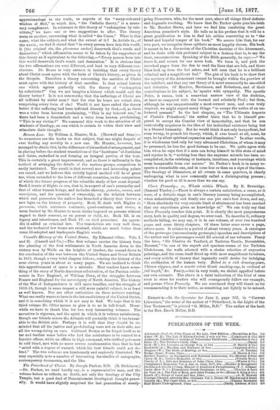The Humiliation of Christ, in its Physical, Ethical, and Official
Aspects. The Sixth Series of the Cunningham Lectures. By A. B. Bruce, D.D. (T. and T. Clark.)—It is impossible to do justice in a short notice to a book so learned, and we may add, so significant, as the one before us is. Dr. Bruce is, we suppose, acknowledged as a leader and representative by those who profess to hold Evangelical tenets both in England and Scotland. The principal aim of this book seems to be the securing of a firmer and more scientific basis for a theory which this school especially insists on,—the theory of "re- demption by substitute." It is significant and satisfactory to find a theologian of this school insisting that "a mysterious doctrine, divested of moral interest, and allowed to assume the aspect of a mere metaphysical speculation, is a doctrine destined ere long to be discarded. Such, for example, must be the inevitable fate of the doctrine of an immanent Trinity, when it becomes disso- ciated in men's minds from practical religious interests, and degenerates into an abstract tenet." Evidently nothing is farther from Dr. Bruce's intention than to insist on the accept- ance of a doctrine repugnant to man's moral instincts, because it has been, as it is said, "revealed," that is, imposed by some external authority. After laying down certain " Christological axioms," derived from an exegesis of Philippians ii. 5-9, and of certain passages in the Epistle to the Hebrews, Dr. Bruce expounds and criticises the most important Christological theories that have been maintained by the Fathers, the Schoolmen, the Lutheran and Reformed divines of Germany, and by modern writers. We cannot follow him in these learned re- searches, but must commend the fairness with which Dr. Bruce criticises every theory, pointing out whatever is valuable in it, as well as what is unsound. We may, however, state that we observe with surprise that theologians, when discussing the Person of Christ, the relation in him of the Logos to the Man, do not attend more to the guidance of St. John, who before he announces that "the Word was made flesh," speaks of that Word as a light 'which lighteth every man." Surely in the relation of the Logos to men, we have an important key for discovering the relation of the Logos to the Man. The text, "If he called them gods, unto whom the word of God came" (John x. 35), should also, one would think, be a classical one on this subject. The kinship of man to God through the Logos is an ele- ment in this question which seems to us far too much neglected. In enforcing his own theory of the Atonement, Dr. Brace does not condemn wholesale all other theories, but rather treats them as approximatiowi to the truth, as aspects of the "many-coloured wisdom of dod," to which this, "the Catholic theory," is a neces- sary comptement. In reference to this theory of "redemption by sub- stitute:" we have one or two suggestions to offer. The theory rests.on another, concerning what is called "the Curse." What is this °arse, what the subject, and what the extent of it ? In Article ix., of the xxxix., we find it stated that "in every person born into this world, it [the original sin, the phronema sarkos] deserveth God's wrath and damnation ;" which affirmation seems to be taken by the supporters of this theory as if equivalent to the following,—" Every person born into this world deserveth God's wrath and damnation." It is obvious that the two affirmations are very different, and lead to very different con- clusions. Dr. Bruce is very earnest in insisting that every theory about Christ must agree with the facts of Christ's history, as given in the Gospels. Therefore a theory concerning the sacrifice of Christ must agree with the history of that sacrifice. Is that actual history one which agrees perfectly with the theory of "redemption by substitute ?" Can we not imagine a history which would suit the theory better ? Is it not noteworthy that the sufferings of Christ are all inflicted by sinful men ? that the sins be bears are actual sins, comprising every form of sin ? Would it not have suited the theory better if the suffering had been inflicted directly by God,—if, as there
as a voice from heaven proclaiming, "This is my beloved son," so there had been a thunderbolt and a voice from heaven proclaiming, "This is my victim ?" We commend this work to the attention of all students of theology, as one which is certain to widen their view and stimulate their thought.



































 Previous page
Previous page